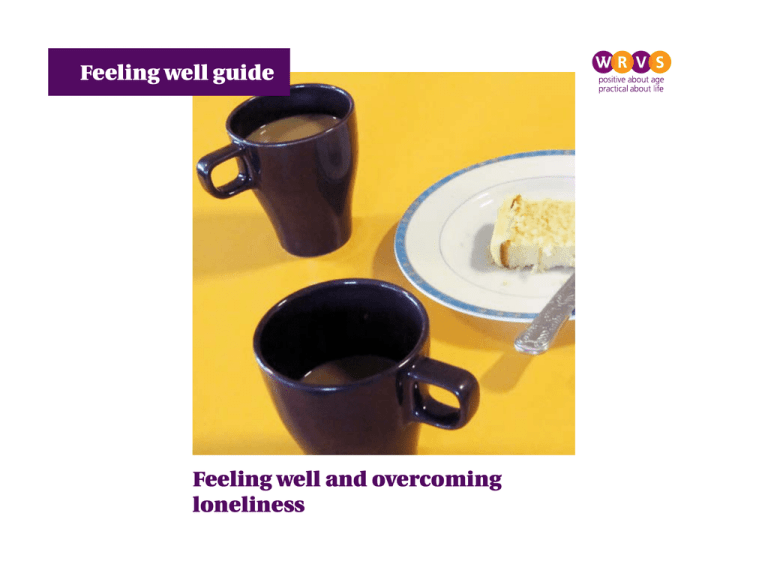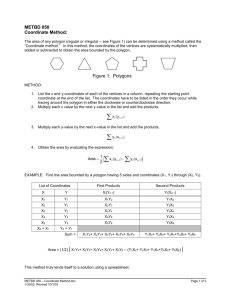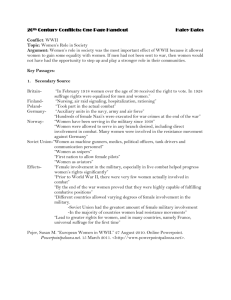Feeling well and overcoming loneliness Feeling well guide
advertisement

Feeling well guide Feeling well and overcoming loneliness Feeling well and overcoming loneliness Feeling physically fit and mentally well are important at any age and the two are closely linked. People who feel fit and well often have a more positive outlook on life, and the reverse can be true too. Feeling unwell or lonely is not an inevitable part of ageing and it’s never too late to think about improving your well-being. Even little changes can make a big difference. This guide provides some general advice for feeling well and overcoming loneliness later in life. 5 small steps to a healthier, happier you A few changes can make a big difference to your overall sense of well-being. Here are five small steps you can take to make you feel better. 1 Get active - do some light exercise, whether it’s tending your garden, using the stairs more regularly or joining a walking club. 2 Get involved - take steps to become more engaged in your local community by visiting a lunch club or volunteering at a local scheme. 3 Stay connected - talking to people is one of the best ways to feel good and avoid loneliness. See friends and family regularly, or if you can’t get out but would like some company try using the internet to keep in touch with people wherever they are. If you don’t have a computer at home most libraries have computers you can use free of charge, or for a small fee. Contact WRVS about its befriending and transport services so you get the practical support you need. 4 5 Eat well - a healthy and balanced diet will help you feel your best. It’s important to stay hydrated too. Meet Richard, a WRVS volunteer... “We mostly cook fresh food. In the past we did it out of necessity but now we do it because it’s cheaper and we feel it’s better for us. We like to know what’s in our food and at our age we need to keep an eye on things like our fat and salt intake. Have one or two meat-free days a week. Years ago we couldn’t always afford meat, and it’s getting expensive again now. Fish is very good for you and we poach it or bake it in the oven. Or we’ll do a big vegetable casserole with pearl barley or lentils. Because you cook the vegetables in the pot you keep all the vitamins in your stew. And the flavour develops so it tastes even better on the second day.” Sleep well - you may find that your sleep patterns change as you get older and you need less sleep than you used to. It might make you feel lethargic and down. You can improve your sleep by reducing day-time naps, going to bed at the same time each night and reducing the amount of caffeine you drink. Healthy eating checklist Looking after your body Staying active Keeping moving and developing strength, flexibility and balance are all increasingly important as we grow older. Keeping fit can help you feel better and maintain a healthy weight, as well as building your confidence, helping you stay independent and improving your general sense of well-being. If you are not very active, you will need to start slowly and build up to more demanding exercise. Your GP can advise you on what’s safe and appropriate for you. If you’re healthy and have no conditions that limit your mobility the Department of Health recommends that you do two-and-a-half hours of moderate aerobic exercise a week. Guidelines also suggest two sessions of muscle strengthening activity every week. If you’re not very mobile or steady on your feet you can do a range of exercises sitting down that will improve your flexibility and strength. If you have a health condition that makes physical activity difficult, speak to your doctor who can help you choose the right exercise for you. You can complete a useful fitness self-assessment at nhs.uk/Livewell/fitness/Pages/physical-activityguidelines-for-older-adults.aspx Conditions and illnesses Contact your GP as soon as possible if you have any concerns about your health. You should also have your eyes checked regularly. People over the age of 60 are entitled to free eye tests, funded by the NHS. These checks mean that a range of conditions including cataracts and glaucoma can be picked up and treated early on. Moderate aerobic exercise includes • • • • Walking Going up stairs Water aerobics Dancing Muscle building activities include • • • • Gardening Carrying heavy shopping Pushing a lawn mower Yoga 1 2 3 4 Eat five portions of fruit and vegetables a day. Drink 6-8 cups of fluid a day - tea, water, juice and squash all count. Eat fish twice a week. Don’t eat too much salt or saturated fat. For more information about eating well, read the free WRVS guide to nutrition, which can be found at wrvs.org.uk Feeling well Feeling well is not just about being physically fit and healthy, it is also important that you feel well mentally. It’s vital to have contact with friends and family whose company you enjoy. If your family don’t live nearby you might want to consider taking up activities or joining groups that will help you to meet people. It can be really hard to make that first step so if you are nervous about going along to a social group you could ask someone to go with you. Community-based clubs are not for everyone so if you’re not keen but would like some company, befriending might be for you. You can arrange for a WRVS volunteer to spend some time with you at home on a regular basis, to have a chat and a cup of tea. WRVS is there every step of the way, providing simple, practical and neighbourly support in your community, which means you’re never on your own. Our befriending service means that you will have someone to talk to when it matters most. Regular phone calls, sending emails or using the online video telephone service Skype can all make staying in touch easier. Volunteering It is also important to stay active and engaged in your local community. Choosing activities that get you out and about, meeting new people or volunteering in your local area can help give you a real sense of achievement in your life. Most people who volunteer give their time in order to help others, but there is a secondary benefit – volunteering is good for you. Working with other people, learning new skills, meeting new friends and knowing that you are making a difference can all help you to stay fit and active. Depression We all feel down from time to time but feeling depressed isn’t an inevitable part of growing older. Depression can be triggered by a range of different events including bereavement, health worries or loss of independence. Whatever causes it, it is a treatable condition. If you are down or think you may be experiencing feelings of depression you should see your GP. Keep a diary of how you’re feeling so you can talk to your doctor about it. It may help you to set yourself little goals for the day, plan your activities, start small and build up to bigger plans. Review your progress and celebrate your achievements. If you have experienced bereavement and would like to know about how other people have dealt with it, log on to wrvs.org.uk/nationwise where you can watch a short film and read tips for dealing with bereavement. Spotting the signs of depression Do you • feel unhappy? • worry or feel anxious a lot? • struggle to find positives in life? • not care about your appearance? • struggle to do simple tasks? • find you’re sleeping too much or too little? Have you • lost interest in life and what you used to enjoy? • withdrawn from family and friends? • lost your appetite? If you have experienced some of these symptoms for more than a couple of weeks visit your GP for support and advice. Meet Gillian... Gillian is a volunteer at the WRVS Cornhill Centre in Banbury. “The benefits are an improved mental attitude and an appreciation of what you’ve actually got. You start to realise how many people are out there who’ve got so much less than you. If you’re feeling lonely and blue, it’s a great place to be and will cheer you up. It might not be for everybody but it’s just so rewarding and enriches your own life as well as many others – just give it a go.” Meet Betty and Elaine Betty is 84 and lives in west Wales. Ten years ago she lost her beloved husband Ken to cancer. “I coped reasonably well because I had a good son, who was close to me,” she says. Two years ago Betty found herself faced with her worst nightmare when her son told her that he had been diagnosed with cancer. “Really, the end of my world seemed to have arrived. I thought, I can’t live without my son, my world is empty.” But life took a different course. She met Elaine, a WRVS volunteer who is part of a befriending service, providing company for older people when they need it most. Elaine sees Betty two or three times a week and is always available, helping her through good times and bad. “I wouldn’t swap Elaine for the world. There is nobody to replace her. She lifts me completely, she really does. When the phone rings and it’s her at the end of the line, it’s a great feeling. You feel you’re wanted. I could be very lonely without her, that’s sure, very lonely. She fills a big space.” How WRVS can help WRVS is Britain’s largest charity working with older people. Its 40,000 volunteers help older people get more out of life, by helping them live independently at home and get involved in their communities. We are there every step of the way, providing simple, practical and neighbourly support, which means you don’t need to be on your own. Our volunteers can help with shopping and support at home and mean you have someone friendly to talk to when you need it most. WRVS volunteers also run community group activities like lunch clubs, IT sessions, and dancing. To find out more about WRVS in your area and how we can help you, go to wrvs.org.uk or call 0845 601 5964 About this guide Useful contacts NHS Choices Provides information on all aspects of health including healthy eating and exercise nhs.uk Depression Alliance A charity that provides information and local support for people affected by depression www.depressionalliance.org For Wales 0845 46 47 wales.nhs.uk Depression UK Provides access to mutual support groups for people experiencing depression depressionuk.org In Scotland 0800 22 44 88 nhsinform.co.uk University of the Third Age (U3A) A self-help group for older members of the community, providing educational, creative and leisure opportunities u3a.org.uk This guide has been developed with the older people WRVS works with, using best practice. It contains general information for feeling well and overcoming loneliness and we hope that older people and their carers and families, find it useful. If you have found this guide helpful, you might be interested in reading other WRVS guides like ‘Helping you plan for a stay in hospital and coming home’, which can be found online at wrvs.org.uk If you need this, or any other guide in a different format please email enquiries@wrvs.org.uk or call 0845 600 5885 Can you help WRVS? If you can spare a few hours every week or fortnight and would like to help older people in your area, please contact us on 0845 601 4670 to find out more about volunteering for WRVS. As a charity, WRVS relies on donations so it can continue to make a difference to older people’s lives. If you would like to make a donation, please go to wrvs.org.uk/donate or call 0845 607 6524 Thank you for any help you can give. Please exercise your common sense when considering this guide and whether to take any of the steps that may be suggested in it. Whilst we have taken reasonable care to ensure that any factual information is accurate and complete, most of the information in this guide is based on our views and opinions (and sometimes the views and opinions of the people or organisations we work with). As a result, we cannot make any promises about the accuracy or the completeness of the information and we don’t accept any responsibility for the results of your reliance on it. Publication date April 2012 J4008Z Registered charity 1015988 & SC038924 ©WRVS 2012





